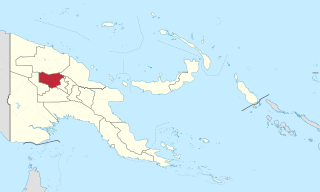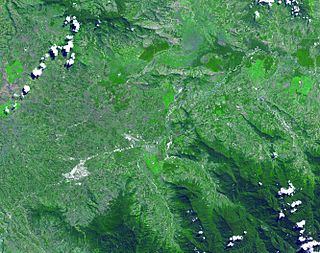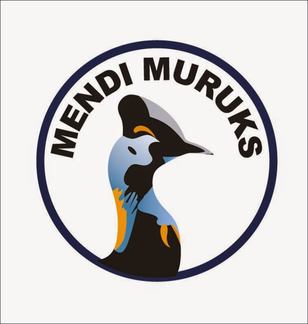Related Research Articles

Papua New Guinea, officially the Independent State of Papua New Guinea, is a country in Oceania that comprises the eastern half of the island of New Guinea and its offshore islands in Melanesia. Its capital, located along its southeastern coast, is Port Moresby. The country is the world's third largest island country with an area of 462,840 km2 (178,700 sq mi).

Enga is one of the provinces in Papua New Guinea (PNG). It is located in the north most region of the highlands of PNG, having been divided from the Western Highlands to become a separate province when the provinces were created at the time of independence in 1975. The people of Enga are called Engans—they are a majority ethnic group—speaking one language in all its five districts: approximately 500,000 people. A small minority of Engans' land on the eastern side of the region remained in the Western Highlands, their territory being accessible by road from Mount Hagen but not directly from elsewhere in Enga territory.

Eastern Highlands is a highlands province of Papua New Guinea. The provincial capital is Goroka. The province covers an area of 11,157 km², and has a population of 579,825. The province shares a common administrative boundary with Madang Province to the north, Morobe Province to the east, Gulf Province to the south, and Simbu Province to the west. The province is the home of the Asaro mud mask that is displayed at shows and festivals within the province and in the country. It is reachable by air and road transport.

Southern Highlands is a province in Papua New Guinea. Its provincial capital is the town of Mendi. According to Papua New Guinea's national 2011 census, the total population of Southern Highlands is 515,511 spread across 15,089 square kilometers (5,826 sq mi).

Mount Hagen is the third largest city in Papua New Guinea, with a population of 46,250. It is the capital of the Western Highlands Province and is located in the large fertile Wahgi Valley in central mainland Papua New Guinea, at an elevation of 1,677 m (5,502 ft).

Mendi, Papua New Guinea, is the provincial capital of the Southern Highlands Province. The Lai River flows by the town. It is served by Mendi Airport. The town falls under Mendi Urban LLG.
Michael Nali CBE is a Papua New Guinean politician. He was the leader of the People's Progress Party from 2002 to 2007 and was Member of Parliament for the electorate of Mendi Open, in Southern Highlands Province, from 1992 until 2007. During this period he held various ministerial positions, including Deputy Prime Minister and Minister for Trade and Industry. At the 2007 general election he chose to contest the Southern Highlands Provincial electorate, which was won by Anderson Agiru.

Kuk Swamp is an archaeological site in Papua New Guinea, that lies in the Wahgi Valley of the highlands. The swamp developed in a former lake basin, as it was filled by an alluvial fan or deposits of water-transported material. Archaeological evidence for early agricultural drainage systems was found here, beginning about 9,000 years ago. It includes draining ditches of three major classes, which were used to convert the area to an anthropogenic grassland. The native crop taro was grown here.

The Roman Catholic Diocese of Mendi is a suffragan diocese of the Roman Catholic Archdiocese of Mount Hagen, in Mendi, Papua New Guinea. It was erected Prefecture Apostolic in 1958 and elevated Vicariate Apostolic in 1965. It was elevated, along with other Oceanic vicariates and prefectures, to a diocese on 15 November 1966. The bishop is Donald Lippert, O.F.M. Cap.

The New Guinea Highlands, also known as the Central Range or Central Cordillera, is a long chain of mountain ranges on the island of New Guinea, including the island's tallest peak, Puncak Jaya 16,024 ft (4,884 m), the highest mountain in Oceania. The range is home to many intermountain river valleys, many of which support thriving agricultural communities. The highlands run generally east-west the length of the island, which is divided politically between Indonesia in the west and Papua New Guinea in the east.

The Engan, or more precisely Enga – Southern Highland languages are a small family of Papuan languages of the highlands of Papua New Guinea. The two branches of the family are rather distantly related, but were connected by Franklin and Voorhoeve (1973).

Mendi Muruks are a Papua New Guinea semi-professional rugby league football club representing Mendi in the Southern Highlands Province of Papua New Guinea. The club's logo features a "muruk", or cassowary. Although originally from Mendi in the Southern Highlands of Papua New Guinea, the team is currently based in Lae due to the current franchise owners. SBS. They have held the Intercity premiership for 4 years in which the first Premiership win was in 1996 and then 10 years later they held the Cup for 3 years from 2006, 2007 and 2008.

Mendi-Munihu District is a district of the Southern Highlands Province of Papua New Guinea. Its capital is Mendi. The population was 144,629 at the 2011 census.
Angal, or Mendi, is an Engan language complex of the Southern Highlands province of Papua New Guinea.
Nande Yer was a Papua New Guinean rugby league footballer who represented Papua New Guinea at the 1995 World Cup.
Mendi is the capital of the Southern Highlands Province of Papua New Guinea.

The cuisine of Papua New Guinea are the traditional varied foods found in the eastern part of the New Guinea island. Approximately 80% of the population is reliant on subsistence agriculture, so a large percentage of food energy and protein consumed in Papua New Guinea is produced locally, while the balance is imported. The staple foods in Papua New Guinea includes root crops, bananas, and sago. Papua New Guinea's diet is largely vegetarian, especially in the Gulf and Highlands regions.

The karuka is a species of tree in the family Pandanaceae and an important regional food crop in New Guinea. The nuts are more nutritious than coconuts, and are so popular that villagers in the highlands will move their entire households closer to trees for the harvest season.

Mendi Urban LLG is a local-level government (LLG) of Southern Highlands Province, Papua New Guinea. The Mendi language is spoken in the LLG.
Upper Mendi Rural LLG is a local-level government (LLG) of Southern Highlands Province, Papua New Guinea. The people living there speak at last 4 different languages: Tambul, Mendi, Ialibu and Engan. It has an estimated population of over 40,000 people.